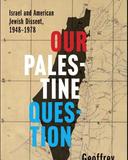Dr Geoffrey Levin
I am a 2025-2026 Koch Junior Fellow in History at Wadham College and an assistant professor of Middle Eastern and Jewish studies at Emory University in Atlanta. My first book, Our Palestine Question: Israel and American Jewish Dissent, 1948-1978, was published in 2023 by Yale University Press and won both the Saul Viener Book Prize from the American Jewish Historical Society and the SERMEISS Book Award in Middle East Studies. As a Koch Fellow, I am working on a second book examining historical American Jewish engagement with Middle Eastern and North African Jewish affairs.
Research Interests
I research the intersection of modern American, Jewish, and Middle Eastern histories with a focus on how Americans have discussed the Middle East and peoples connected to the region. My use of underutilized archival materials illuminates the stories of forgotten diplomats, activists, and intellectuals who shaped American and Middle Eastern foreign policies and cultural attitudes. My book projects and articles challenge conventional understandings of U.S.-Middle East relations, transnational Jewish ties, and Israel/Palestine studies, connecting the fields in a manner that erodes the boundaries between them.
My first book, Our Palestine Question: Israel and American Jewish Dissent, 1948-1978, shows that American Jews have grappled with challenging questions arising from Israel’s power over the Palestinians since 1948, an intervention that breaks with conventional wisdom that such concerns only arose after 1967. From the very birth of the Palestinian refugee question, Israeli officials attempted to manage American Jewish conversations on this issue, a finding that highlights the role of the Israeli state in shaping transnational ties.
I am currently working on a second book, tentatively titled America’s Jews of Islam: Middle Eastern Jews and American Jewish Politics. It examines the broader encounter between Middle Eastern/North African (MENA) Jews and American Jews amidst the emigration of 800,000 Jews from Arab countries, mostly to Israel, between the 1940s and the 1970s, a migration funded in part by American Jews. While this American Jewish role might make sense given the Zionist notion of Israel as a refuge, it also held contradictions. Supporting mass migration also reflected a lack of faith in diasporic Jewish futures and differed from American Jews’ strategy of opposing antisemitism at home through integration rather than emigration. The project also explores how discourses about antisemitism in Arab lands emerged and how perceived intra-Jewish racial difference influenced American Jewish political advocacy.





